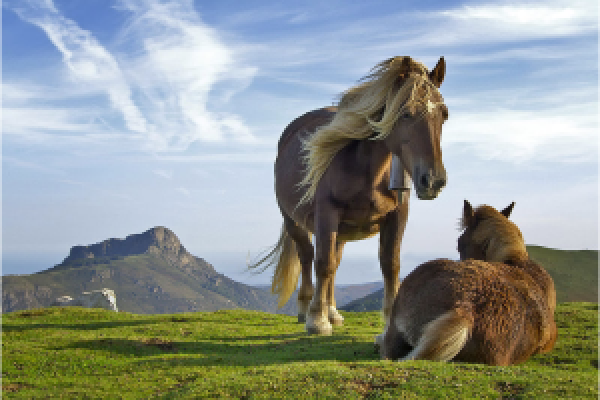
Learn Survival Basque
Wikitravel users have collectively created a free Basque phrasebook with the goal of making it possible for travelers to "get by" while traveling in areas where Basque is spoken.
Wikitravel phrasebooks are available in many languages and each one varies in depth and detail. Most of the phrasebooks include a pronunciation guide, a general phrase list, information about dates and numbers, a color list, transportation-related phrases, vocabulary for shopping and phrases for eating and drinking. Some are even more in depth, and all are free!
From Website
Basque (Basque: Euskara, pronounced [eus̺kaɾa]) is the ancestral language of the Basque people, who inhabit the Basque Country, a region spanning an area in northeastern Spain and southwestern France. It is spoken by 25.7% of Basques in all territories (665,800 out of 2,589,600). Of these, 614,000 live in the Spanish part of the Basque country and the remaining 51,800 live in the French part.
In academic discussions of the distribution of Basque in Spain and France, it is customary to refer to three ancient provinces in France and four Spanish provinces. Native speakers are concentrated in a contiguous area including parts of the Spanish Autonomous Communities of the Basque Autonomous Community (Spanish: País Vasco; Euskara: Euskadi) and Navarre and in the western half of the French Département of Pyrénées-Atlantiques. The Autonomous Community of País Vasco/Euskadi is an administrative entity within the binational ethnographic Basque Country incorporating the traditional Spanish provinces of Biscay, Gipuzkoa, and Álava, which retain their existence as politico-administrative divisions.
These provinces and many areas of Navarre are heavily populated by ethnic Basques, but the Euskara language had, at least until the 1990s, all but disappeared from most of Álava, western parts of Biscay and central and southern areas of Navarre. In southwestern France, the ancient Basque-populated provinces were Labourd, Lower Navarre, and Soule. They and other regions were consolidated into a single département back in 1790 under the name Basses-Pyrénées, name which persisted until 1970.
A standardized form of the Basque language, called Euskara Batua, was developed by the Basque Language Academy in the late 1960s. Euskara Batua was created so that Basque language could be used—and easily understood by all Basque speakers—in formal situations (education, mass media, literature...), and this is its main use nowadays. This standard Basque is taught and used as a teaching language (as an option, together with standard Spanish) at most educational levels in the Spanish part of the Basque Country, while the intensity, status and funding by state bodies to Basque language instruction varies depending on the area. In France, the Basque language school Seaska and the association for a bilingual (Basque and French) schooling Ikasbi meet a wide range of Basque language educational needs up to the Sixth Form, while often struggling to surmount financial and administrative constraints.
Apart from this standardized version, there are five main Basque dialects: Bizkaian, Gipuzkoan, and Upper Navarrese in Spain, and Navarrese-Lapurdian and Zuberoan (in France). Although they take their names from the mentioned historic provinces, the dialect boundaries are not congruent with province boundaries.
As a language isolate, Basque is something of a linguistic curiosity, as it has no relatives among other European languages and indeed among any language at all. The language was long suppressed by national governments in France and Spain; but in the 20th century, it reemerged as a living language, partly as a political statement for Basque independence.
The Basque alphabet is a Latin-derived alphabet used to write the Basque language. It consists of 27 letters.